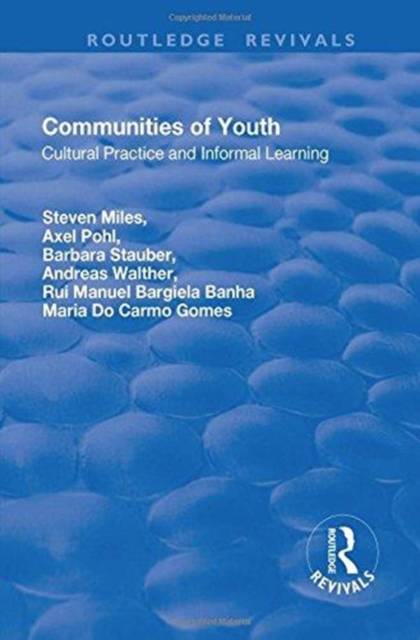
- Afhalen na 1 uur in een winkel met voorraad
- Gratis thuislevering in België vanaf € 30
- Ruim aanbod met 7 miljoen producten
- Afhalen na 1 uur in een winkel met voorraad
- Gratis thuislevering in België vanaf € 30
- Ruim aanbod met 7 miljoen producten
Communities of Youth
Cultural Practice and Informal Learning
Steven Miles, Axel Pohl, Barbara Stauber, Andreas Walther, Rui Manuel Bargiela Banha, Maria Do Carmo Gomes
€ 148,95
+ 297 punten
Omschrijving
This title was first published in 2002.Communities of Youth critically evaluates what it means to be a young person at the beginning of the twenty-first century and the problems, opportunities and dilemmas that emerge from the experience. The book is concerned with putting key conceptual debates to do with youth in a comparative cutting-edge empirical context. In particular, it endeavours to transcend what its contributors feel is one of the most damaging trends of recent work on the question of youth, namely: the division between young people's transitions and youth culture. Building upon the notion of lifestyle as a means of bridging this gap, the book provides something original and timely: a way of linking young people's broader structural concerns with the cultural and community contexts within which they conduct their everyday lives. The data discussed in the book emanates from a comparative European Union project conducted in Great Britain, Germany and Portugal. The three training programmes examined are based on the performing arts, but the authors argue that the skills young people glean from these courses are more to do with generic skills such as the ability to work effectively in groups, mutual responsibility, discipline and above all, confidence, than the technical proficiencies of performance. These courses become an important part of the young people's lives and as such, provide a space within which they become themselves. In this sense, the book highlights the fact that far from being passive recipients of public policy, young people actively engage with the power structures that combine to shape their lives. Communities of Youth therefore considers the diversity of European youth and by tapping into this diversity it develops important recommendations that will inform academic debate, research and youth policy.
Specificaties
Betrokkenen
- Auteur(s):
- Uitgeverij:
Inhoud
- Aantal bladzijden:
- 150
- Taal:
- Engels
- Reeks:
Eigenschappen
- Productcode (EAN):
- 9781138730137
- Verschijningsdatum:
- 22/11/2017
- Uitvoering:
- Hardcover
- Formaat:
- Genaaid
- Afmetingen:
- 152 mm x 219 mm
- Gewicht:
- 281 g

Alleen bij Standaard Boekhandel
+ 297 punten op je klantenkaart van Standaard Boekhandel
Beoordelingen
We publiceren alleen reviews die voldoen aan de voorwaarden voor reviews. Bekijk onze voorwaarden voor reviews.










